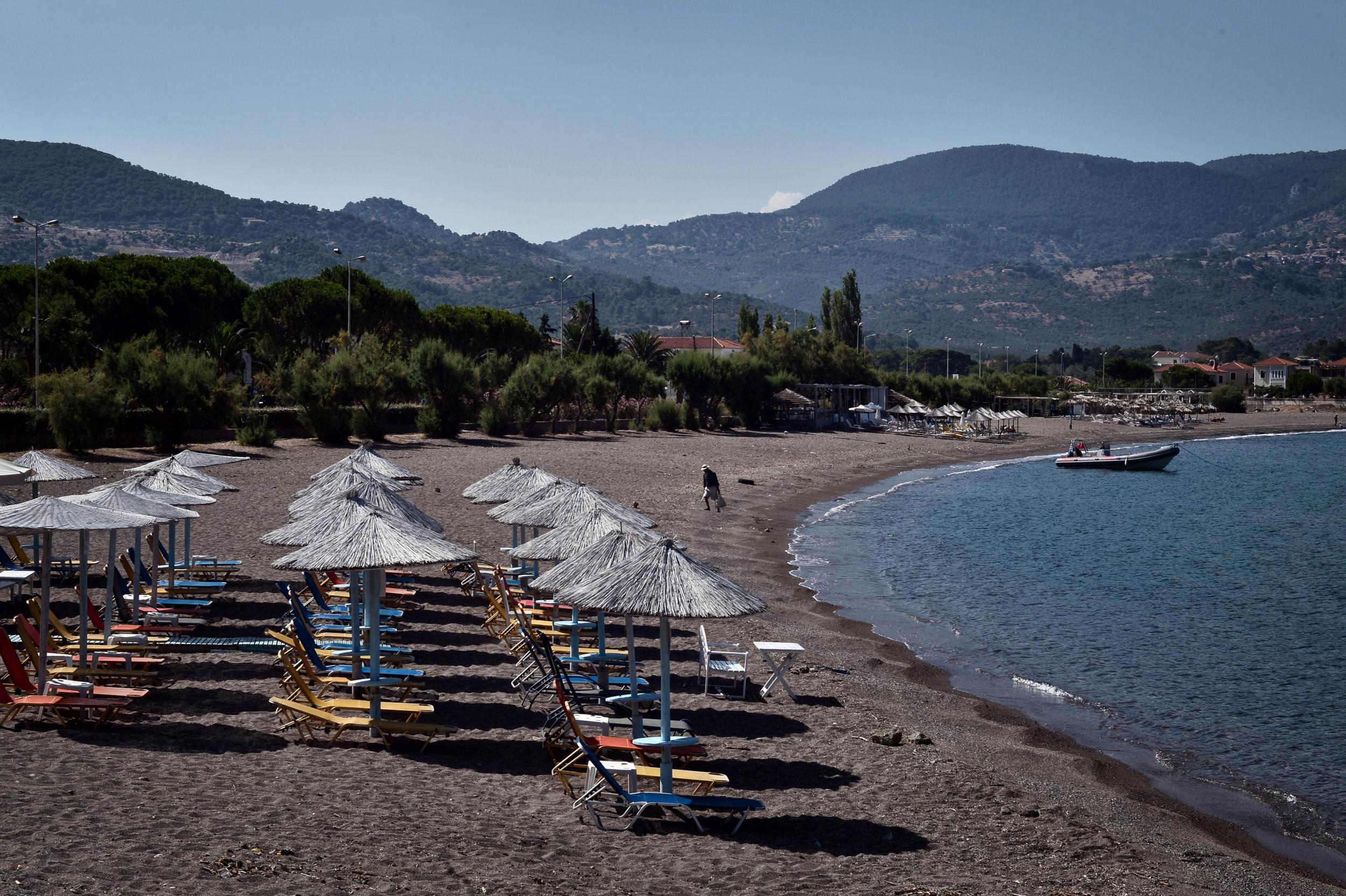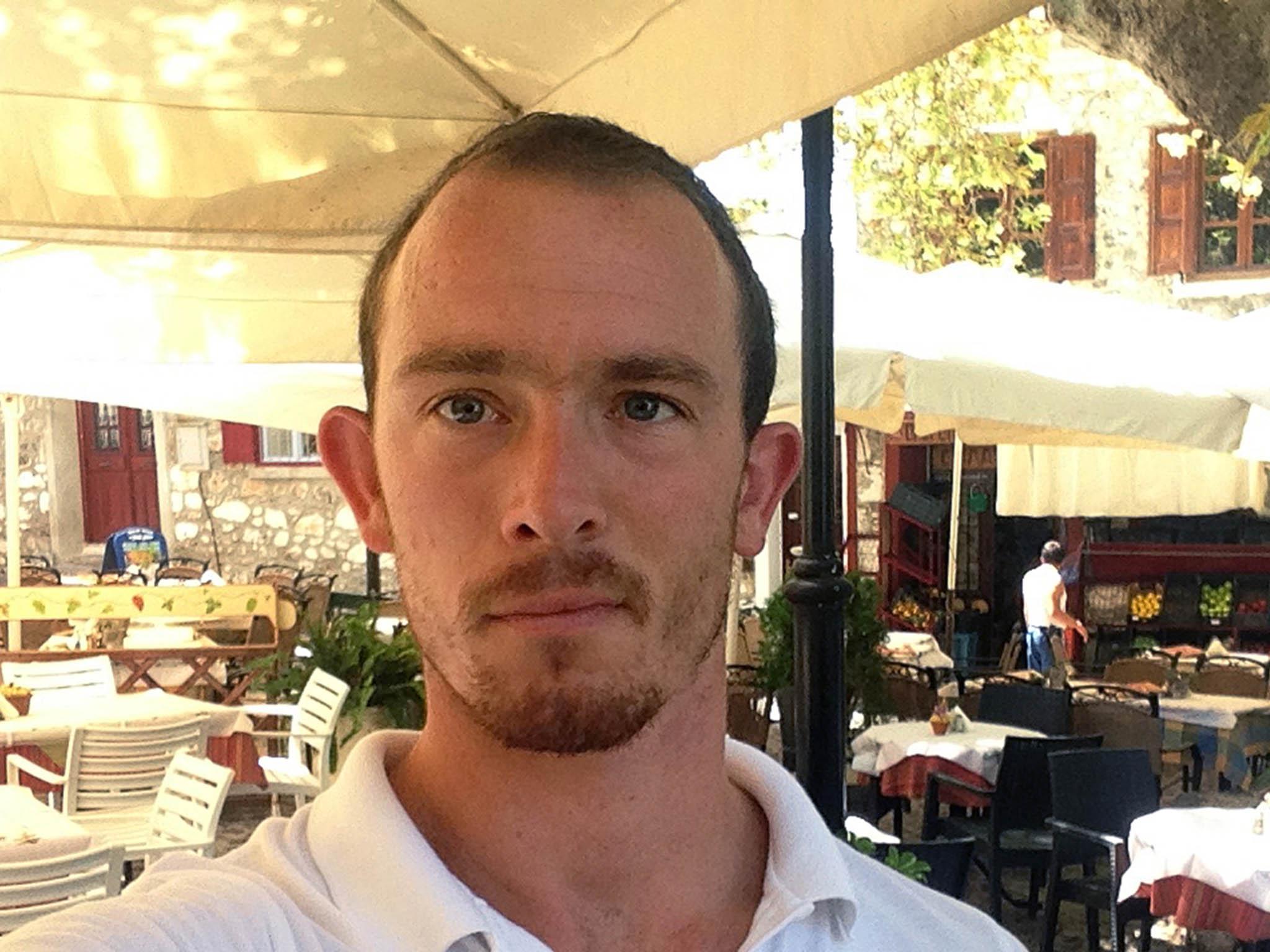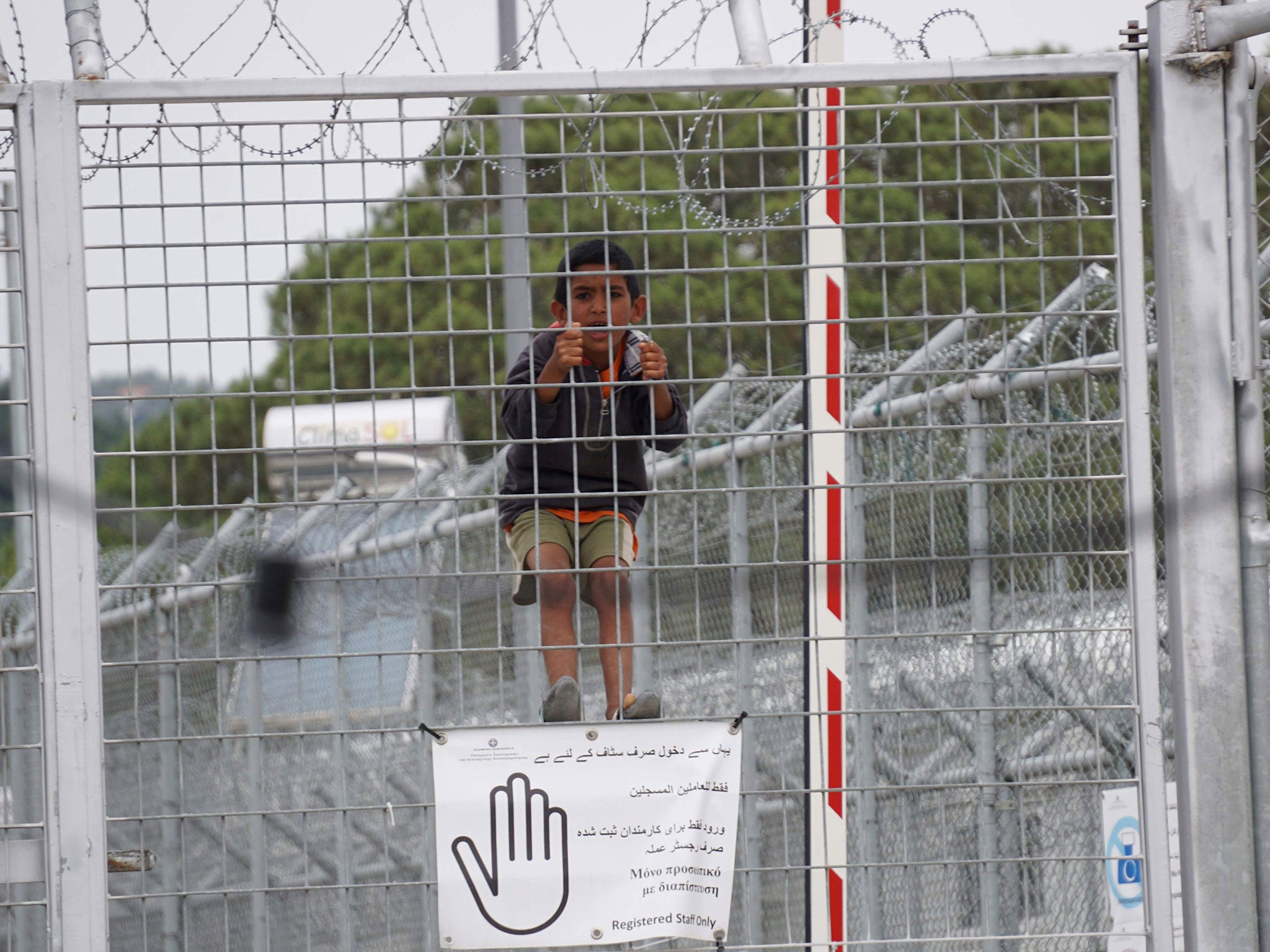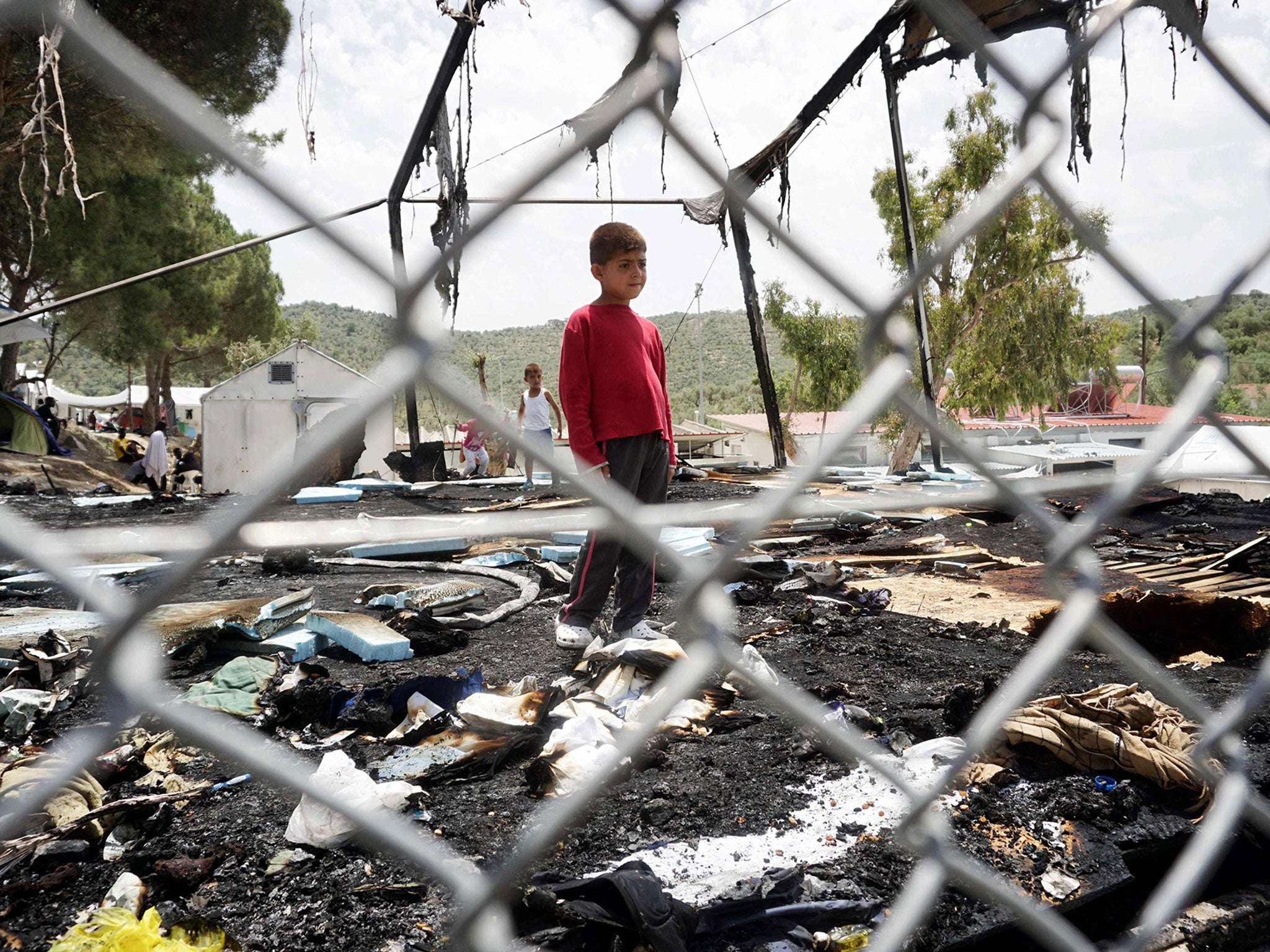How the refugee crisis turned Lesbos waiters into goat herders and spread ripples of pain across Europe
When thousands of refugees alighted on their shores, Greek islanders were praised for their generous response. Now as tourism and jobs dry up, many feel abandoned

Your support helps us to tell the story
From reproductive rights to climate change to Big Tech, The Independent is on the ground when the story is developing. Whether it's investigating the financials of Elon Musk's pro-Trump PAC or producing our latest documentary, 'The A Word', which shines a light on the American women fighting for reproductive rights, we know how important it is to parse out the facts from the messaging.
At such a critical moment in US history, we need reporters on the ground. Your donation allows us to keep sending journalists to speak to both sides of the story.
The Independent is trusted by Americans across the entire political spectrum. And unlike many other quality news outlets, we choose not to lock Americans out of our reporting and analysis with paywalls. We believe quality journalism should be available to everyone, paid for by those who can afford it.
Your support makes all the difference.This is a story about war and waiting tables, about how a line can be drawn between the chaos in Syria and Theodore Kourniaris lost his job in Molyvos on the Greek island of Lesbos.
In the eastern isles of Greece, the hidden face of the European refugee crisis is an everyday guy like Mr Kourniaris, who suspects he has been cheated – not only by Syrian President Bashar al-Assad, who drops barrel bombs on his own people, but also by leaders such as German Chancellor Angela Merkel, who threw open the door to refugees and then slammed it shut.
Mr Kourniaris, 27, is a Greek waiter who lives with his mother. He has spent every summer season since he was a boy humping bottles of chilled retsina and plates of grilled octopus to German and British and Dutch merry-makers in packed tavernas in his picture-postcard-perfect village on the sea.
The tourists? “They’re gone,” says Mr Kourniaris. The April-to-October trade that sustains the island has vanished, as middle-class European pensioners and young families with children decided they would not spend their holidays on an island that hosted 600,000 war refugees and economic migrants over the past 18 months. The islanders, it's worth noting, had greeted those same refugees with hot food and blankets as they emerged from the cold waters of the Aegean, winning praise from all quarters.
Mr Kouniaris lost his waiting job when tourists stopped visiting. To survive, he will spend the winter months, if he is lucky, tugging on goat teats. “By hand,” he says. “Hundreds of them.” For around €20 a day.
If you don’t care that Mr Kourniaris and thousands like him have lost their jobs on the hardest-hit Aegean island, he suggests you try milking goats.
Without the summer season, Mr Kourniaris not only will lose his restaurant wages but also could be denied three months of government unemployment benefits, which he relies on to get through the winter. He will lose his health insurance, too. “I’m barely keeping my head above the water,” he says.

There were many tourists here last year – during the worst of the crisis – and thousands of asylum seekers arrived each day. “They came up on our beach, right there,” says Dimitrios Vatis, 71, co-owner of the Aphrodite Hotel, pointing to the pebbly beach in a secluded cove. He says members of his staff would excuse themselves from the hotel restaurant and run down to carry the children ashore.
Sitting at a table by the wine-dark sea, the hotelier flips open his reservation books and sighs. For 2015, the pages were all coloured in red, meaning almost every room was booked. For 2016, it’s almost all white, meaning empty.
“We feel nobody cares about us. Nobody takes a moment to think of the cause and effects of these things,” Mr Vatis says. “We hear them. They call us fascists now, because we complain. But we helped the refugees before anyone! Before the NGOs, before the UN, we helped them. Now, if you’re even a little bit anti-immigrant, if you say, ‘Wait a minute,’ you’re a fascist.”
Tourism is a wipeout this year. “The situation is the worst in 50 years on the island,” said Periklis Antoniou, chairman of the Lesvos Hoteliers Association, which uses an alternate spelling of the island, and owner of the Heliotrope Hotel.
Many charter flights have been cancelled, and even domestic runs from Athens are down. The cruise ships have pulled out. The international travel agents have pivoted away from Lesbos and its sister islands, and bookings are down by 70 to 90 percent, Mr Antoniou says.
“I don’t blame the media,” he says. But why, he asked, are newspapers and broadcasters still recycling images from last year showing the crisis in the islands at its worst – for instance, of the indelible image of a toddler drowned on a beach? The boy washed ashore in Turkey, not Greece, Mr Antoniou points out.
“You have to look very hard to find a refugee today,” said Melinda McRostie, who runs a Greek taverna, the Captain’s Table, in the Molyvos harbour with her husband Theodoris. She also founded a group, the Starfish Foundation, to assist refugees.
She describes the stages the island’s residents have gone through: “People were shocked, then they helped the refugees – a lot. Now they’re angry, and I see it, they’re scared: ‘Are we going to be refugees too?’ ”
In March, a deal was struck between the European Union and Turkey that threatens to return asylum seekers to Turkey. Since then, the illegal smuggling has slowed to a trickle – but it has not stopped completely.
Earlier this month, the Greek coast guard reported that four people drowned and six were rescued when a boat overloaded with migrants capsized off Lesbos, according to Reuters.
Last year, the Greek islands were an open turnstile toward a new life in Germany or Sweden. Now, they are Europe’s waiting room.

There are some 42,000 asylum seekers in grim camps on the Greek mainland and 8,000 more stuck in the eastern Greek islands. There are about 3,000 still on Lesbos, most at two camps near the island’s biggest town.
With a wealth of misery in the world, the crash in the tourism economy here might not seem like a big deal, the waiters of Lesbos admit. “You don’t see people eating out of skips yet,” says Kourniaris. “But this winter? You might.”
Raphael Vouas, 54, closed his popular Sansibal Restaurant here. After 23 years, there weren’t enough customers to keep it open and pay staff. That’s seven more Greeks without a job.
“Now I am the tourist,” the restaurateur says. He spends his days at the beach or sitting in a cafe drinking coffee. “Look at me, I have a tan,” he says grimly.
Bureaucrats in Brussels mostly shrug: it’s just a few islands; they’ll bounce back. The European Union is now struggling to absorb the million-plus asylum seekers it has already let in, most from Syria. Athens has no real plan to make the small-scale restaurateurs and their employees here whole again.
The frustration felt on the Greek islands is another bell ringing in Europe about the challenges posed by a globalised world, even as Europe encouraged one of the largest mass migrations in history.
The locals here believe they did right by the war refugees – they were on the front line, and they say they would help again. But now they feel abandoned.
The Greeks on Lesbos understand the refugees’ plight. Their grandparents had similar experiences. Many locals are descendants of Christian Greeks who were forcibly repatriated from Turkey – as Muslim Turks were from Lesbos – in the aftermath of the First World War.
Ask an unemployed Greek waiter today what he thinks about Donald Trump and his anti-immigration stance, and even the socialists say the New York real estate mogul might be on to something. Residents here are quick to say that they found the beaches littered with foreign passports – from Morocco, Iran, Algeria, Pakistan – abandoned by migrants looking for a backdoor to Europe.
“They weren’t all war refugees, and they weren’t all Syrians,” says Michael Konstantellis, 39, who has waited tables and has worked as a DJ and travel agent.

These same feelings – these micro-stories of anger and abandonment – are spreading across Europe. The images of waves of asylum seekers coming ashore in Lesbos nine months ago were in part behind Britain’s vote to abandon the European Union, and they are stoking an anti-immigration tide in Austria, France and Denmark. “It's the butterfly effect,” says Mr Kourniaris.
The Pope came to Lesbos to highlight the migrant crisis. So did UN Secretary General Ban Ki-moon, Queen Rania of Jordan and Angelina Jolie. The people of Lesbos are short-listed for a Nobel Peace Prize for their generosity. The locals say, “We can’t eat prizes.”
© Washington Post
Join our commenting forum
Join thought-provoking conversations, follow other Independent readers and see their replies
Comments